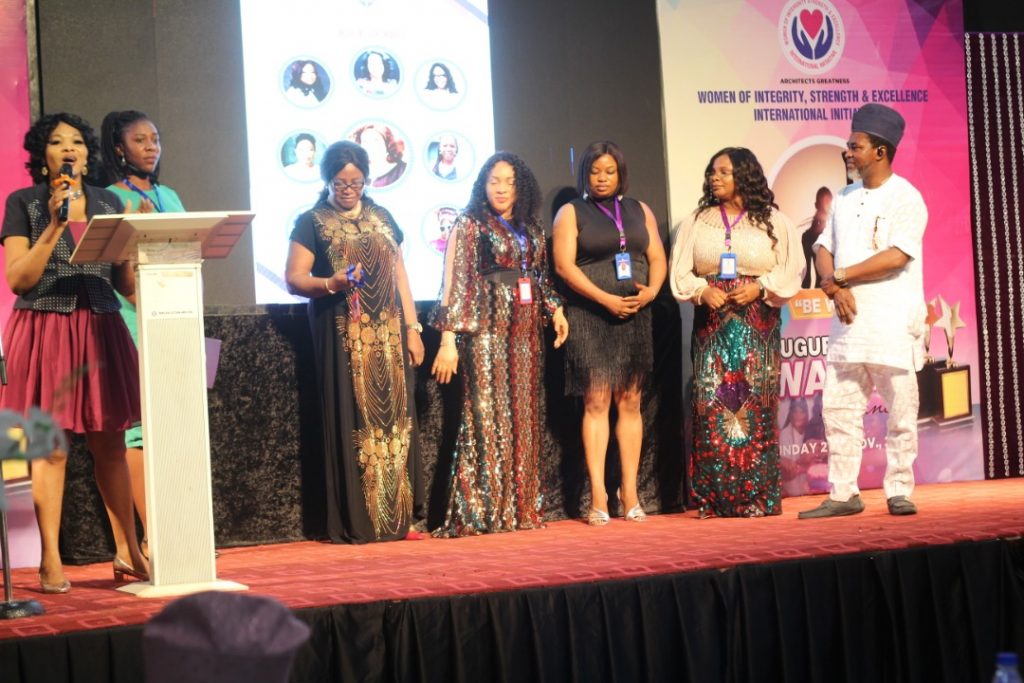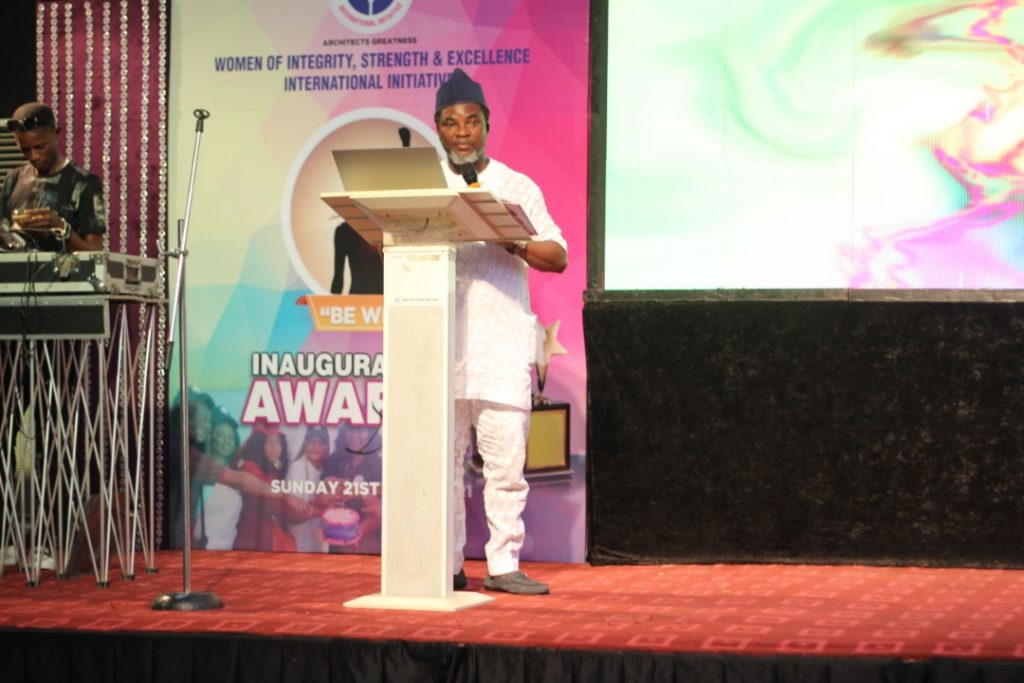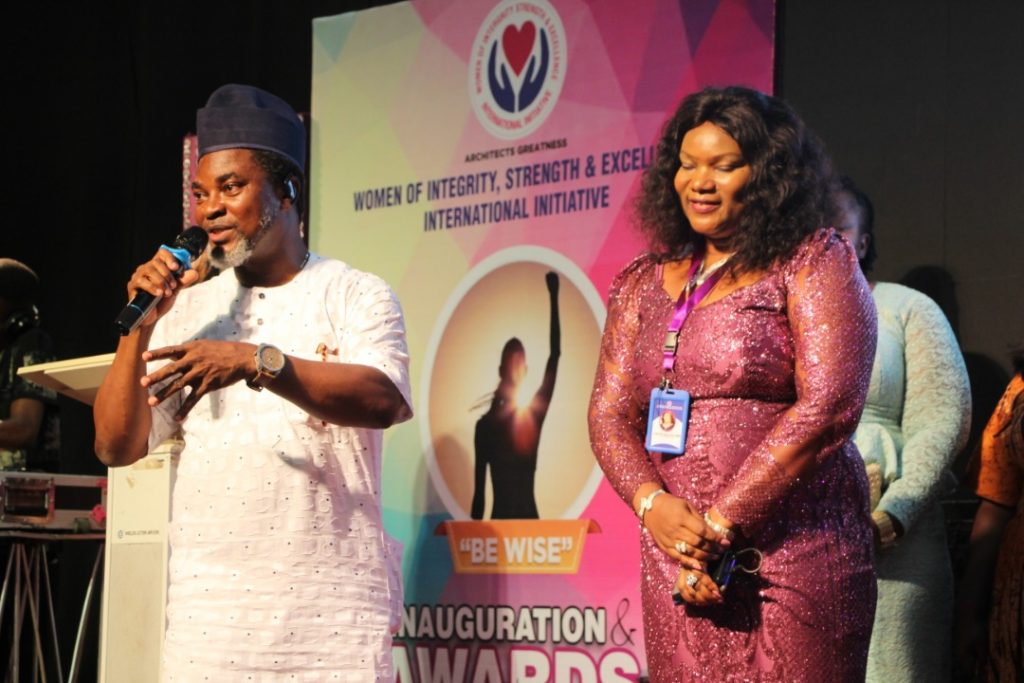THE GIRL-CHILD; MAKING THE FUTURE COUNT.
BEING THE KEY NOTE ADDRESS PRESENTED BY ADESINA ADEGBITE, FCIMC AT THE INAUGURATION AND AWARD CEREMONY OF WOMEN OF INTEGRITY, STRENGTH AND EXCELLECE INTERNATIONAL INITIATIVE (WISE), ON 21ST NOVEMBER, 2021.

INTRODUCTION
The topic I am about to discuss as I intend to treat this engagement as more of a conversation than a presentation, is very dear to me and I believe everyone who values the need to preserve the future must pay attention to the interest and wellbeing of the Girl child. Many of us are guilty of acts capable of diminishing the status of the female gender and this often started from the kind of treatment and attention accorded the girl child during her adolescence years. In a deliberate effort geared towards changing the narrative and bringing to the fore the challenges faced by the girl child and the possible remedies to the unfortunate societal nurtured anomaly, the subject of discussion today is centered not around but on the girl child.
WHO IS A GIRL-CHILD?
There is a need for us to actually understand who a girl child is. A girl-child is a biological female offspring from birth to eighteen (18) years of age. A girl-child can also be described as a female child between infancy and early adulthood. During this period of the development of the girl-child, she is under the custody and supervision of adults who may be her parents, guardians or siblings who are older and more matured.
EARLY DEVELOPMENT AND INFLUENCES
The girl-child is easily influenced by her experiences as she develops. She models her behavior during this development process, through observation and adaptation of the lifestyles of her parents, guardians, community leaders, family members, school teachers, celebrities and sometimes peers. These unconscious influencers contribute to the moulding of a girl child either positively or negatively.
From the family circle to the public spheres, the girl-child has suffered much hardship and has been greatly discriminated against. This is due to the fact that she is regarded as inferior to her brother or male counterpart. She is devalued, disrespected and regarded as a second class citizen.
Discriminatory practices against the girl-child is very rampant in Africa, Middle-East and Asia. In these societies, the girl-child has been consigned to an inferior status for which she constantly wears a daunted image. This inferiority is as a result of the patriarchal ideology in the society which bestows undue importance to the male child. The result of this is that, the male child does everything to undermine the female child in order to arbitrarily institute values and ideologies in the society. The patriarchal ideology that is common in most parts of Africa, Asia and the Middle-East has influenced the way the girl-child characters are projected by the male focused society thereby constructing female children as passive and inconsequential lots. The African society have unjustifiably dehumanized the female gender over the years, and I use the Eastern part of Nigeria as an example, where a female child is under the custom and tradition of most Igbo communities considered as undeserving of an inheritance. Therefore, while the male child is clothed with legitimacy to beneficially inherit his father’s assets, his female sibling(s) are disinherited by the custom and tradition. This repugnant and obnoxious discriminatory tradition must in my view be immediately jettisoned.
CHALLENGES FACED BY A GIRL-CHILD
Below are some of the challenges that are being faced by a girl-child:
1. Child/Domestic Labour
2. Teenage Pregnancy
3. Early Marriage
4. Gender Discrimination
5. Lack of/Inadequate Education
6. Sexual Abuse
7. Female Genital Mutilation
8. Poverty
1. Child Labour/Domestic Servant:
Child labour is a situation where underage children, particularly female children are procured for the sole purpose of working as domestic servants or maids, hawkers, shop/store attendants, farm workers etc. Child labour is mostly caused by many factors especially poverty and lack of education.
It is a common practice especially in Africa that a girl-child between the age of 7 to 17 years that is from a poor or disadvantaged background most often get to be employed as a house help or house girl as some like to describe them. This kind of practice ought to be discouraged in our society. A less privileged girl-child is susceptible to being subjected to the burden of excessive house chores, ceaseless errands and long hours of farm work.
The Child Rights Act [L.F.N. 2004 Cap. L1.], in Section 28 prohibits child labour, especially excessive and exploitative labour. A girl child in particular must be protected against any labour that will adversely affect her physical, mental, spiritual, moral or social development. To this end, parents, guardians and institutions should ensure the protection of the girl-child against undue exposure to excessive labour.
2. Teenage Pregnancy:
This is also known as adolescent pregnancy. It is the pregnancy that occurs in girls between ages 13-19 years. Sadly, girls younger than 13 years often get impregnated in recent times. Pregnancy among adolescent girls has implications on their educational opportunity, health and wellbeing. It also has implications on the society as uncontrolled teenage pregnancy will lead to population explosion. The prevalence of cases of teenage pregnancy is caused by a variety of factors which include lack of care and proper mentoring and monitoring by parents or guardians as the case may be. Prevention of teenage pregnancy is the responsibility of all. Parents, guardians, religious leaders, community leaders, institutions and the Government must be actively involved in efforts towards reduction of teenage pregnancy. Organisations like Women Of Integrity, Strength And Excellence International Initiative (WISE) must make this an agenda by embarking on immediate advocacy campaigns to address this ugly trend that has far reaching consequences on the wellbeing of not only the girl child but also of the Society. It must be emphasized that teenage pregnancy is one of the greatest causes of child and maternal mortality.
3. Early/Child Marriage:
Early or Child Marriage is a marriage or union between two people in which either or both parties are younger than 18years. Early marriage is a distasteful practice that denies girls their rights to make vital decisions about their sexual health and well-being. Cases of child marriage are common in Nigeria. This is particularly more rampant in the Northern part of the country. It is also a common practice in the Middle-East and some Asian countries. It is indeed a crime against womanhood for a girl-child to be forced into early marriage when she was not mentally and physically prepared for sexual life.
In some of the societies where early marriage is predominant, the practice is either due to tradition or as a result of economic challenges. Some parents often feel that a girl-child is an economic burden and therefore, marry her off at a tender age for pecuniary benefits. Early marriage has tendency to have devastating effects on the girl child. Some of the adverse effects early marriage are:
. Increase in girls’ vulnerability and exposure to emotional, physical and sexual abuse
. Possibility of Inability to Access Quality Education
. Child and Maternal Mortality
. Increased risk of Exposure to Sexually Transmitted Infections (STIs)
There should be a value change and mental reorientation towards the value of a girl-child. It is pleasing to note that child marriage has now been prohibited under the Child Rights Act. However, the reality is that many girl child are still being betrothed and pushed into marriages by parents and guardians in some parts of Nigeria and across the world. The Child Rights Act specifically provides in Part III Sections 21, 22 and 23 thus:
21. Prohibition of child marriage
No person under the age of 18 years is capable of contracting a valid marriage, and accordingly a marriage so contracted is null and void and of no effect whatsoever.
22. Prohibition of child betrothal
(1) No parent, guardian or any other person shall betroth a child to any person.
(2) A betrothal in contravention of subsection (1) of this section is null and void.
23. Punishment for child marriage and betrothal
A person‐
(a) who marries a child; or
(b) to whom a child is betrothed; or
(c) who promotes the marriage of a child; or
(d) who betroths a child,
commits an offence and is liable on conviction to a fine of N500,000; or imprisonment for a term of five years or to both such fine and imprisonment.
Most unfortunately, despite this very clear provisions, people still engage in flagrant violations of the right of the girl child by promoting and engaging in child marriages across the country.
The interest and wellbeing of a child should ordinarily be of paramount consideration in every action of the parent or guardian of a child and this itself is a protected right under the law. Section 1 of Part I of The Child Rights Act provides that
- Best Interest of a Child to be of Paramount Consideration in all Actions.
In every action concerning a child, whether undertaken by an individual, public or private body, institutions or service, court of law, or administrative or legislative authority, the best interest of the child shall be the primary consideration”.
It is thus disheartening that despite the provisions of the Law, some deluded and misguided parents or guardians still give out their female children in marriage and in most cases against the will of such children in violation of the provisions of the Child Rights Act. We are all aware that Marriage is a contract, therefore, a girl child that is forced into an early marriage has been unfairly forced into a contractual relationship against her will.
So many young girls have been deprived of their dream and aspiration in life due to their inability to have good education as they were unduly exposed to motherhood life and responsibilities at an early age.
4. Gender Discrimination:
From the family circle to the public sphere, the girl-child is deemed and regarded as inferior to her brother. She is devalued and regarded as a second class citizen in a society ruled by male chauvinism. In most African societies, the girl-child has been consigned to an inferior status for which she constantly wears a daunted image. This society imposed inferiority on the girl child is caused by the patriarchal ideology in the society which bestows undue greater advantage on the male child. Most parents and very unfortunately even the male siblings often undermine the female child in furtherance of adherence to those ideologies and obnoxious value system in the society. Therefore, this influences the way the female gender are projected by their male counterpart and consequently constructing the girl child as a passive and inconsequential of the lot. This sort of discrimination is responsible for the practice in the Eastern part of Nigeria where it is the practice that a female child is not entitled to inheritance. Such discriminatory traditions and customs must be denounced by all and immediately abolished.
5. Lack of/Inadequate Education:
Girls have the right same right to education as boys. Educated girls can make informed choices – and from a far better range of options. Educating girls saves lives and builds stronger families, communities and economies. An educated female population increases a country’s productivity and fuels economic growth. When you educate a girl child you educate a nation.
In some parts of Nigeria today, females are prevented from having access to formal education and formal skill acquisition. This is a rather unfortunate practice that has debilitating effect on the welfare and wellbeing of both the girl child and women. There has to be an urgent shift from this discriminatory practice against the girl child in order to safeguard the future of the girl child. Rapid economic development is dependent upon elimination of gender bias. Female education is indeed an investment that will help facilitate the achievement of a more peaceful and prosperous world. Examples abound across the globe of female political leaders, CEOs and administrators who are doing greatly. Some of the globally renowned female world leaders are: Angela Merkel (German Chancellor), Hillary Clinton (former United States Senator and former Presidential Candidate), Jacinda Ardern (Prime Minister of New Zealand), Theresa May (former United Kingdom Prime Minister), Ellen Sirleaf-Johnson (former President of Sierra Leone), Christina Fernadez de Kiirchner (former President of Argentina), Chistine Lagarde (Managing Director of IMF), Ngozi Okonjo-Iweala (Director General, WTO), Janet Yellen (Chair of the United States Federal Reserve), Aung San Suu Kyi (Leader of Myanmar who was unlawfully toppled by the Military), Amina Mohammed (Deputy Secretary-General United Nations), Ibukun Awosika (first female Chairman of First Bank), Folorunso Alakija (Businesswoman and richest woman in Africa), just to mention a few. We also have successful female professionals whose lives are inspirations to the womenfolk like Aloma Mariam Mukhtar (first Female Chief Justice of Nigeria), Chief Folake Solanke SAN (first female Senior Advocate of Nigeria), Funke Adekoya SAN (founding Partner at AELEX, of the biggest law firms in Nigeria). The list of very successful women who have positively impacted the world using their position and offices is endless. This is a testament to the fact that if a girl child is educated, she can get to the very apex of her career.
6. Sexual Abuse:
This is an act of molestation or abusive sexual behaviour perpetrated by person with the use of force or by taking advantage of another. Sexual Abuse could be in form of rape, procurement as slaves, bodily stimulation, inappropriate physical handling or touches, or even exposure to pornography. Where a girl-child is sexually abused, there is tendency that she may become disoriented and suffer depression. Sexual abuse of a child has short and long-term physical and mental health, emotional and consequences. Examples of such physical health consequences include:
. Sexually Transmitted Infections (STIs)
. Physical Injuries
. Chronic conditions such as heart disease, obesity and cancer
Examples of mental health consequences include:
. Depression
. Posttraumatic Stress Disorder (PTSD) Symptoms
Examples of behavioural consequences include:
. Drug or Substance Abuse/Misuse
. Risky or Abnormal Sexual Life
. Suicidal Thoughts and Possible Attempts
All efforts must be put in place to prevent girl-child sexual abuse and protect the girl child against such abuses. Sensitization about sex education is very key in eradicating or addressing incidence of sexual abuse. Young female children must be thought on the importance of abstinence from sexual intercourse and the need to avoid all manner of immorality including drug abuse and indecent dressing. The justice system must also be courageous and determined in ensuring punitive sanctions for sexual abusers and child molesters appropriately.
7. Female Genital Mutilation:
This is a procedure which involves cutting or altering the female genitals. It is a practice that manipulates, alters, or remove the external genital organs in young girls and women. The procedure is performed using a blade, knife or sharp object, often performed by religious leader or an unorthodox medical practitioner and in some cases qualified medical practitioner. Female Genital Mutilation (FGM) often put the life of the girl child at risk. In contrast to the male circumcision, FGM produces no known health benefits and is not performed for medical reasons. It is mostly performed in adherence to traditional beliefs and customs. Although the have been a sustained campaign against FGM globally, the practice still exists in some rural societies across Africa.
8. Poverty:
This is a state or a condition in which a person lacks the financial resources and essentials for a minimum standard of living. The term poverty has been associated for example with joblessness, poor health, lack or low standard of education or skills, high rates of disorderliness, homelessness and general financial deprivations. Poverty contributes substantially to the failure of some parents to give their girl child formal education or training. It is thus very exigent that Governments at all levels across the world must strive to eradicate poverty to safeguard the future of the vulnerable less privileged in the society which invariably will cascade into the safeguarding of the future of the girl child.
It is important to state that poverty is sometimes the reason for poor sanitation or poor hygienic life styles among women and girl child. A girl child needs support in order to maintain hygienic condition once they commence their menstrual cycle. Most of these children are unable to afford sanitary pads thereby adopting the usage of all manner of unhygienic tissues and even cloths for menstrual cycle. The consequence of such situation is the possibility of infection that may have life time effect of the unprotected vulnerable girl child. This is why the efforts of some individuals and institutions that have chosen to carry out support initiatives to help the vulnerable girl child in the society by sensitizing them on the need to maintain hygienic personal life styles and providing them with sanitary pads is most commendable. One such initiatives is “She SABI Initiative being sponsored by Kimberly-Clark Nigeria. The initiative focuses on eradicating period stigma and providing young girls with the much needed menstrual-hygiene support and education at a time critical for the growth and development of self- esteem, self-confidence and socialization skills. There is also an organization known as IDEAL Child Foundation ran by my good friend and learned colleague, Ms Awele Ideal, an Asaba, Delta State based Legal Practitioner, whose primary focus is to supply young girls, especially within Delta State with sanitary pads. Hundreds of young girls in Delta State have benefited from her initiative. As a Rotarian, I must also mention the efforts of Rotary International in helping young girls maintain hygiene and protect their dignity. As part of their humanitarian services, several Rotary Clubs in Nigeria and across the globe often donate sanitary pads to young school children. Rotary Club of Ogba, District 9110, where I am a Past President recently visited a Secondary School in Ogba, Oke-Ira Senior Secondary School, where dignity packs were distributed to the female students of the school. Notwithstanding the good examples referenced above, more concerted and sustained efforts need to be put into ensuring greater support for the girl child in all ramifications.
CONCLUSION
Having identified the factors and challenges militating against the interest of a girl-child, we must have recourse to what should be done to protect the future of a girl-child. Therefore, in harnessing and investing in the future of a girl-child, we must ensure that the girl child gets access to quality education, empowered through acquisition of skills, capacity building, protected against molestation and sexual abuse, access to medical care and good health facilities, exposure to information technology and training, abolishment of discriminatory practices, availability of social and Economic Support Systems, greater and more effective protection of the rights of the Girl Child.
It is also important to introduce policies that will enhance and promote the dignity of a girl child. Thus, it is commendable that as part of efforts to give recognition and promote the interest of the girl child, October 11, 2021 was declared the International Day of Girl-Child to celebrate female folks in general. As earlier stated, concerted efforts should be geared towards access to education and empowerment for the girl-child in order to secure the future of the girl child and enable them contribute meaningfully to the society.
When the girl-child is empowered, it benefits all. This is because the girl-child who is empowered matures into an empowered woman who uses her independent economic status to nurture the new generation, thereby making the future count for all. She will stimulate economic growth not only for herself and families, but for communities and the Nation. The mankind is the greatest beneficiary of a world where Girl-Child has a secured future. We must all therefore join the campaign for the preservation of the dignity of the girl-child and collectively work towards ensuring the rights of the girl-child are respected and protected at all times.
Thank you for listening.
Adesina Adegbite, FICMC
Lead Partner, Adereti Adegbite & Co.
Past National Welfare Secretary, Nigerian Bar Association.
See more pictures below:













